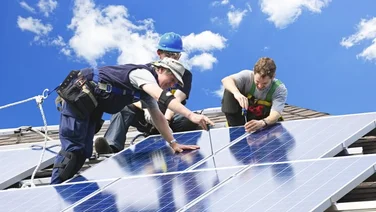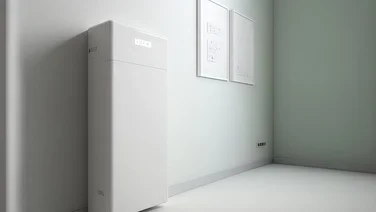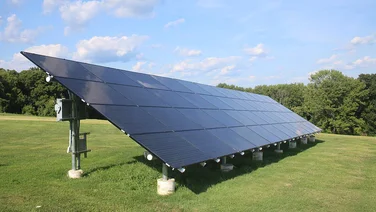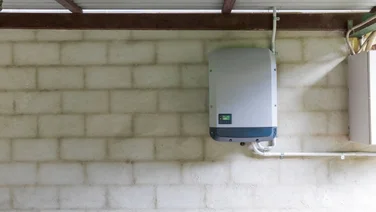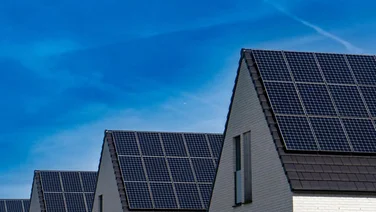- Portable solar panels can power small appliances, such as phones or kettles
- There are two types: rigid foldable panels and flexible panels
- Portable solar panels can cost anywhere between £100 and £500

Portable solar panels are a bit different to other types of solar panels because they are great for long outdoor camping trips, or for homeowners that are unable to install solar panels on their roofs.
And by placing them wherever you like, you’ll be able to expose them to more sunlight, which will mean you’ll break even on the price of your solar panels quicker.
In this article, we’ll explain what exactly portable solar panels are and how you can use them. We’ll also take a look at their cost, efficiency, and how much power they can generate.
Want to find out how much mounted solar panels will cost you? Head to our solar panels costs page for more information.
Where do you want to install solar panels?
Get startedWhat are portable solar panels?
Portable solar panels are small, plug-in panels that you can take anywhere with you. Unlike mounted units, portable panels can’t power an entire home, but can be used to charge small electrical appliances, such as phones, laptops, or even microwaves.
There are typically two types of portable panels: flexible solar panels and rigid foldable ones.
Flexible solar panels are thinner and more lightweight than foldable solar panels, with most bending at least 30 degrees, and even sometimes more.
Rigid foldable solar panels, on the other hand, don’t bend – but they can be folded up for easier storage.
Like fixed solar panels, portable solar panels work on cloudy days. They’ll still be exposed to sunlight, it’ll just be filtered through the clouds.
However, solar panels operate best in direct sunlight, so they won’t produce as much electricity on cloudy days.
In most cases, you can’t plug your electrical devices directly into a portable solar panel. You’ll need to connect your panels to an inverter to convert the direct current (DC) electricity your panels generate to alternating current (AC) electricity.
If you want to use solar electricity after you’ve put away your panels, you’ll then need a portable solar battery, and use a charge controller, which will protect your battery from overcharging. Once you’ve done this, you’ll be able to charge your appliances from your solar battery.
If you’re interested in installing mounted solar panels on your property, we can help. Just fill in our short form, and we’ll put you in touch with professional solar panel installers who can give you tailored quotes.
How to use portable solar panels
When positioning your portable solar panels, it’s a good idea to point them south, and tilt them at a 30 degree angle. This way they’ll be exposed to the maximum amount of sunlight.
If your panels are laid flat – on your car for example – they’ll still produce electricity, although they might not produce as much as they would if they were titled.
Similar to a mounted solar system, to use the electricity your portable panels generate, you need to connect them to a solar inverter.
Solar inverters convert the direct current (DC) electricity generated from panels into alternating current (AC) electricity – the kind electrical appliances use.
If you want to use solar energy during the evening, or after you’ve put away your panels, you’ll also need a charge controller and a portable solar battery. A charge controller stops batteries from overcharging, and is sometimes built into portable solar batteries.
The connecting cables and ports that you’ll need are usually included with the portable solar panels.
Most providers sell all the necessary equipment you’ll need as part of a solar generation kit. But if not, you can usually find everything you need with one provider, just sold separately.
Where do you want to install solar panels?
Get startedWhat are portable solar panels used for?
Portable solar panels are typically used to power small devices during extended outdoor journeys or activities, such as on camping trips, boat trips, or hikes.
Larger portable solar panels can also be used to power electrical appliances in motorhomes or boats. There are also marine solar panels designed specifically for boats, so be sure to check out our page if you want to find out more.
Want more eco-friendly tech for camping? Read all about solar ovens on our page.
But you don’t need to be an outdoor fanatic to use portable solar panels. Nothing’s stopping you from putting some in your garden or on your balcony, and using them to charge your phone or laptop.
Find out more about balcony solar panels on our page.
Portable solar panels can be a great option for people who can’t install mounted solar panels on their roof. If you live in a rented property or a flat, for example, it can be tricky to get permission to install a solar panel system.
You can read more about the ins and outs of installing solar panels for flats in our handy guide.
How much power can portable solar panels provide?
The amount of power your portable solar panel will provide depends on its wattage, its efficiency rating, and the amount of sunlight it absorbs. Like mounted systems, portable solar panels tend to produce more electricity in the summer than in the winter.
A typical 100-watt (W) portable solar panel can produce around 0.6–0.7 kilowatt hours (kWh) in one day, in optimal conditions. That’s enough to keep a few phones or a laptop charged.
Larger 300 W portable solar panels can produce between 1.8– 2.1 kilowatt-hours (kWh) in a day – enough to power small appliances, such as kettles or microwaves.
Solar panel wattage | Power generated on a summer’s day | Power generated on a winter’s day |
|---|---|---|
100 W | 0.6–0.7 kWh | 0.08 kWh |
200 W | 1.2–1.4 kWh | 0.16 kWh |
300 W | 1.8–2.1 kWh | 0.24 kWh |
400 W | 2.4–2.8 kWh | 0.32 kWh |
The figures in the table suggest that portable solar panels are best suited to power relatively small electrical appliances.
This is because they typically don’t produce enough electricity to power large appliances, such as full-sized refrigerators or washing machines, or to charge the battery of an electric car.
To do this, you would need multiple large portable solar panels connected to the same solar battery. But this would take up a lot of space, and make moving your solar panels system more challenging.
For comparison, to power a three-bedroom house, you would need a solar panel system made up of ten 350 W panels. On an average day the solar panel power output would be around 7.2 kWh.

How big are portable solar panels?
The size of your portable solar panel will depend on its wattage – generally, the bigger the wattage, the larger the panel will be. The overall weight will also vary by make and model.
Portable solar panels are typically around 150 cm by 40 cm for a 100 W panel, and around 200 cm by 100 cm for panels above 300 W.
It’s also worth bearing in mind that foldable solar panels can be collapsed to around two-thirds, or even half, of their original size.
Flexible solar panels, however, can’t be folded – but they can be bent around objects. They’re also much more lightweight than rigid panels, usually weighing between 2 kilograms (kg) and 5 kg, whereas rigid foldable solar panels weigh between 5 kg to 10 kg.
Pros and cons of portable solar panels
- Less expensive than mounted solar panels
- Don’t need to be installed by a professional
- Can be used on the go
- Don’t require planning permission, so can be used in flats or rented properties
- Won’t produce enough energy to power an entire home/motorhome
- Usually need to be paired with a solar battery
- Some models can be quite heavy to carry
Advantages of portable solar panels
Portable solar panels are less expensive than standard mounted solar panels. Most portable solar panels cost under £500, whereas fixed solar panels cost an average of £703 up front..
And since the typical three-bedroom house in the UK needs about 10 panels in its solar system, it typically ends up costing homeowners a total of £7,026.
Portable solar panels are cheaper than standard solar panels because they are smaller, and don’t need to be installed by a professional.
Similar to mounted panels, most users don’t need to get planning permission for portable panels. So if you rent, or live in a flat or in a listed building – properties where it can be difficult to get permission to install mounted solar panels – portable panels could be an easy way to start using solar energy.
Find out more about using solar panels in a rented flat on our helpful Guide to Solar Panels for Flats.
Disadvantages of portable solar panels
Since portable solar panels are much smaller than mounted solar panels, they won’t be able to produce enough electricity to power an entire motorhome. They’ll only be able to power a few small appliances.
Unlike a solar panel system for a property – which doesn’t necessarily need a solar storage battery, unless the user wants to store excess energy – portable panels aren’t directly connected to the home’s electrical system.
But if you are using larger portable panels to power several appliances, we’d recommend using a battery to store the electricity. This way you can use it after you’ve put your panels away, or at night.
How much do portable solar panels cost?
Portable solar panels cost between £100 and £500, but this will depend on their wattage, efficiency, and the make and model.
Technically, you can buy portable solar panels for as low as £50, but these are usually quite small and won’t produce much electricity. They’ll only produce enough to keep one or two lightbulbs on, or slightly recharge a phone.
Large portable solar panels – ones over 300 W – can cost up to £1,000. These will usually be able to fully power laptops or televisions.
Although it can be tempting, we wouldn’t recommend going for the cheapest model you can find. It’s likely to be less efficient than pricier models, and probably won’t be able to generate enough electricity to meet your needs.
When choosing a portable solar panel, it’s a good idea to look at its efficiency rating – the best solar panels are over 20% efficient. You should also note the warranty period – typically 10 years – which is a guarantee of how long your solar panel will operate at maximum efficiency.
How efficient are portable solar panels?
Most rigid foldable portable solar panels are 15%–20% efficient – the same levels of efficiency as standard mounted solar panels. Some providers, such as EcoFlow, even offer portable solar panels that are up to 23% efficient, though these tend to cost more.
Flexible solar panels are slightly less efficient than rigid ones, and have efficiency ratings of around 10%–15%.
The main difference between standard mounted solar panels and portable solar panels is not their efficiency but their size. Portable panels are much smaller than standard panels, so they’ll produce less electricity.
Do portable solar panels require much maintenance?
Like standard solar panels, portable panels don’t require much maintenance. The main thing owners need to do is keep their solar panels clean and clear of dust or debris.
The best way to clean your portable solar panels is with warm soapy water and a non-abrasive soft sponge.
Most providers will provide you with a manual, which will include care and cleaning instructions, so give it a read if you’re unsure of how best to care for your portable solar panels.
How often portable solar panels need to be cleaned depends on the environment they are in. For example, if it’s snowed, or has been very dry and dusty, they’ll need to be cleaned more often.
Mounted panels only need to be cleaned every 5–10 years, but portable solar panels will likely need to be cleaned more frequently, since they’ll be exposed to dust and other materials whilst travelling around.
Interested in other forms of portable green tech? Read our guide to portable heat pumps.
Next steps
Although they won’t produce enough energy to power an entire house, portable solar panels are an easy way to use green electricity to power a few small appliances.
They’re a great option for those who can’t install fixed solar panels – if you live in a rented property or listed building, for example – or for anyone wanting to use solar energy on the go.
Solar panels are becoming more popular, with 69% of Brits saying they’d buy a property with solar panels according to our National Home Energy survey.
So, if you want to use solar energy to power your entire home, we can put you in touch with professional installers for standard mounted solar panels. Just fill in our short form, and our network of installers will reach out to you with their best prices.


